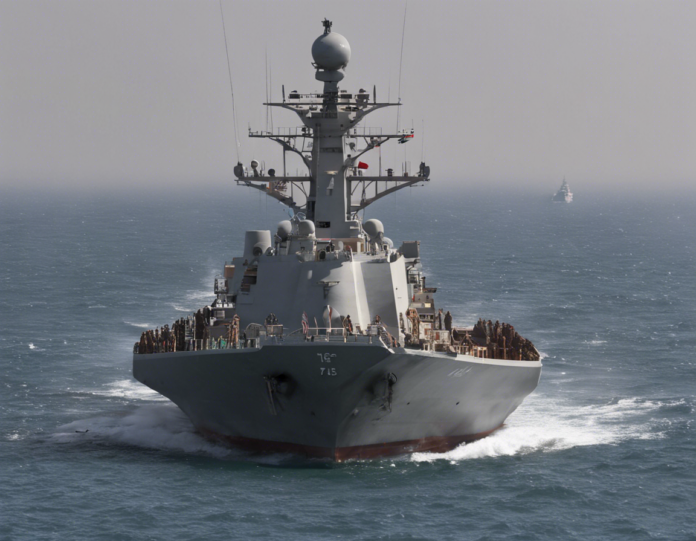Introduction
In recent times, escalation has become a prevalent concern in global affairs. The ongoing geopolitical tension in the Middle East is a prime example of how conflicts can quickly spiral out of control. The recent Iranian strike on an Israeli ship is a stark reminder of the fragile nature of international relations and the potential for further escalation. In this article, we will delve into the intricacies of the Iran-Israel conflict, analyze the implications of the recent attack, and discuss the potential scenarios for escalation in the region.
The Iran-Israel Conflict
The Iran-Israel conflict has deep historical roots and is primarily driven by geopolitical, religious, and ideological differences. Iran, an Islamic republic, has long been a vocal critic of Israel, which it does not recognize as a legitimate state. Iran’s support for Palestinian militant groups, such as Hamas and Islamic Jihad, has further strained its relations with Israel. On the other hand, Israel views Iran as a existential threat due to its nuclear program and support for anti-Israeli proxies in the region.
The Recent Attack
The recent Iranian strike on an Israeli ship in the Gulf of Oman has heightened tensions between the two adversaries. The MV Helios Ray, an Israeli-owned cargo ship, was hit by a missile in an apparent act of aggression. While no one claimed responsibility for the attack, Israeli officials were quick to point fingers at Iran. The incident marked a significant escalation in the conflict and raised concerns about the potential for further violence.
Implications of the Attack
The Iranian strike on the Israeli ship has far-reaching implications for the region and beyond. It has raised fears of a wider conflict involving not just Iran and Israel but also their respective allies. The attack has also highlighted the vulnerability of commercial shipping in key waterways, such as the Strait of Hormuz and the Gulf of Oman, which are vital for global trade. Furthermore, the incident has put pressure on the international community to respond and prevent a further escalation of hostilities.
Potential Scenarios for Escalation
The Iranian strike on the Israeli ship has opened the door to several potential scenarios for escalation in the region. One possible scenario is a direct military confrontation between Iran and Israel, which could result in a full-blown war with regional and global ramifications. Another scenario is a proxy war, where Iran and Israel use their respective allies to wage a conflict by proxy. This could further destabilize the already volatile Middle East and draw in other major powers.
Escalation Control Measures
To prevent further escalation in the Iran-Israel conflict, it is imperative for all parties involved to exercise restraint and diplomacy. Communication channels should remain open to avoid misunderstandings that could lead to unintended consequences. International mediators, such as the United Nations and regional organizations, should play a proactive role in de-escalating tensions and promoting dialogue between Iran and Israel. Additionally, economic sanctions and other pressure tactics can be used to deter further aggression and incentivize a peaceful resolution to the conflict.
Frequently Asked Questions (FAQs)
-
What is the root cause of the Iran-Israel conflict?
The Iran-Israel conflict is driven by geopolitical, religious, and ideological differences, with Iran’s support for anti-Israeli groups and Israel’s perception of Iran as an existential threat contributing to the tension. -
Why is the recent Iranian strike on an Israeli ship significant?
The recent Iranian strike on an Israeli ship has escalated tensions between the two adversaries and raised concerns about the potential for further violence and conflict in the region. -
What are the potential scenarios for escalation in the Iran-Israel conflict?
Potential scenarios for escalation include direct military confrontation, proxy wars, and wider regional conflict involving other major powers. -
How can escalation in the Iran-Israel conflict be prevented?
Escalation in the Iran-Israel conflict can be prevented through restraint, diplomacy, open communication channels, international mediation, and the use of economic sanctions to deter further aggression. -
What are the implications of the Iranian strike on the Israeli ship?
The implications of the Iranian strike on the Israeli ship include fears of wider conflict, vulnerability of commercial shipping, pressure on the international community to respond, and the need to prevent further hostilities.
In conclusion, the recent Iranian strike on an Israeli ship underscores the precarious nature of the Iran-Israel conflict and the potential for further escalation in the region. It is imperative for all stakeholders to work towards de-escalation and a peaceful resolution to prevent a spiral of violence with devastating consequences.





